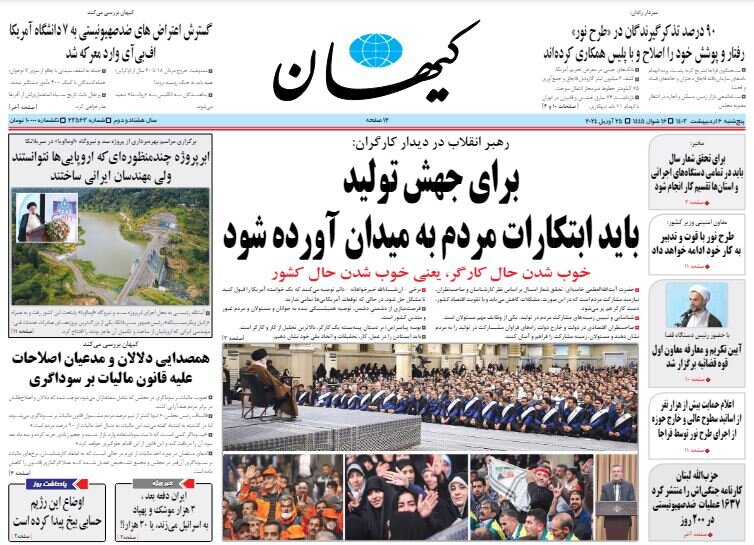Next time, will Iran fire 3,000 missiles and drones at Israel, or 30,000?!

TEHRAN - In a note, Kayhan reacted to the claim of an Israeli analyst and wrote: According to a Zionist analyst, Iran's unprecedented attack on Israel was even more severe than Russia's attack on Ukraine, but we do not know whether next time Iran will fire three thousand missiles and drones or more.
Upon Iran's attack on Israel on April 13, the relations between the two sides entered a new phase and chapter. Such attacks are not acceptable and tolerable for Arab countries. Despite all their differences with Israel over the Gaza issue, the cooperation of Arab countries, especially Jordan, was very important to deal with the recent attack because Iran challenged the stability of the entire region and all countries in the region. The fearfulness and projection of the Zionist analyst is while he was excited during the terrorist act of the Zionist regime in Damascus. He said that the most important point in the attack was that the highest official of the Quds Force of the Islamic Revolution Guard Corps was killed in a sensitive country like Syria. This attack showed more than anything that Israel's intelligence about the location of the attack and the people present there was accurate. Many believe that if Israel had been in conflict with Iran earlier, Iran would not have supported the October 7 attack. However, this scenario failed either.
Iran: Deterrence is not a tool but a goal
In an analysis, the Iran newspaper pointed out the role of deterrence in the True Promise operation. It wrote: This operation was an obvious military operation that not only provided the basis to prevent the spread of tension by the Zionists in the region but for a few nights, it led to the creation of an unofficial ceasefire in the Gaza war. It also broke the myth of the invincibility of the Zionist regime in the public opinion of the Arab world. This action moved the situation in the West Asia region towards the establishment of peace and ensured the general satisfaction of the political units along with the public opinion. The "armed peace" that Tehran formulated and designed in its defense doctrine has turned the turbulent region of West Asia into a place for achieving peace and security more than ever before. The historical experience of the compromising relations of the countries of the region with Israel shows that any path other than raising the cost of war measures by the Zionist regime will lead to an increase in tension by this regime and ultimately the spread of war in the region.
Hamshahri: The biased and anti-Iranian resolution of the European Parliament
Hamshahri wrote about the biased and anti-Iranian resolution of the European Parliament: The European Parliament on Thursday, in a resolution without considering Iran's legitimate and legal right to respond to the Zionist regime, condemned Iran's recent missile and drone operations to the occupied territories and demanded more sanctions against Iran. This is because according to the United Nations Charter, international conventions, especially the 1961 Vienna Convention on Diplomatic Relations, the Zionist regime's attack on the Iranian embassy is condemned, and Iran could respond legally and according to Article 51 of the United Nations Charter. The representatives of the European Parliament highlighted the alleged destabilizing role of Iran in the Middle East by ignoring more than 7 months of crimes and killings of the oppressed people of Gaza and the West Bank by the Zionist regime, and this regime's attack on the neighboring countries. This resolution of the European Parliament was issued while no attention was paid to the destructive and destabilizing role of the Israeli regime and its supporters in the region.
Etemad: Biden's failed game with Iran's nuclear issue
Rafael Grossi, the director of the International Atomic Energy Agency, claims that Iran is a few weeks away from having enough enriched uranium to make a nuclear weapon. Since Biden took office, the White House's game with Iran's nuclear issue has turned into his general policy against Tehran. Consecutive deadlocks arose in the revival of the JCPOA, with the United States unilaterally withdrawing from it. Now the Biden government has been confused along with other regional and global crises. Therefore, with accusations at times, he is trying to make it appear that Tehran has made the situation more complicated in the nuclear field. On the other hand, Tel Aviv may be considering taking action against Iran's nuclear targets and sites by bringing the United States into a confrontation with Iran. Both of these situations can change Iran's nuclear doctrine. But it seems that Tehran has no intention of doing such a thing and as the official authorities have declared many times, Iran's nuclear program is peaceful, and in the current situation, the resistance forces in the region, which are Iran's allies, are enough to restrain Israel.
